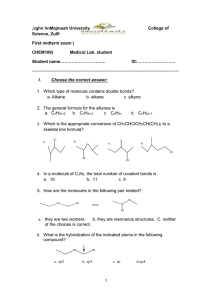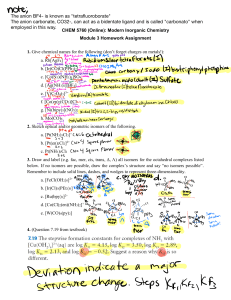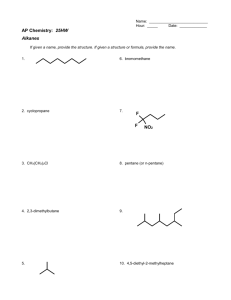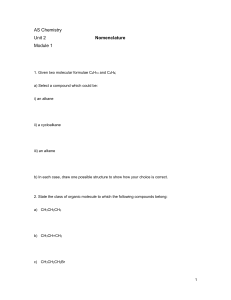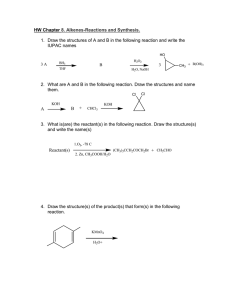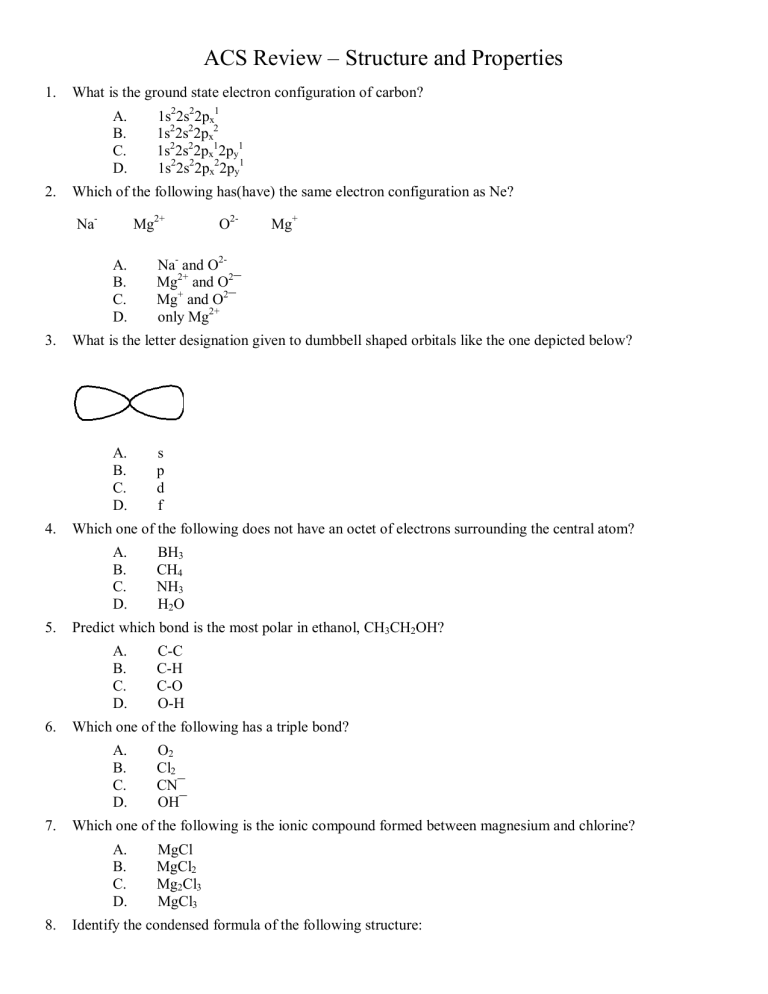
ACS Review – Structure and Properties 1. What is the ground state electron configuration of carbon? A. B. C. D. 2. Which of the following has(have) the same electron configuration as Ne? Na- Mg2+ A. B. C. D. 3. BH3 CH4 NH3 H2O C-C C-H C-O O-H O2 Cl2 CN¯ OH¯ Which one of the following is the ionic compound formed between magnesium and chlorine? A. B. C. D. 8. s p d f Which one of the following has a triple bond? A. B. C. D. 7. Na- and O2Mg2+ and O2¯ Mg+ and O2¯ only Mg2+ Predict which bond is the most polar in ethanol, CH3CH2OH? A. B. C. D. 6. Mg+ Which one of the following does not have an octet of electrons surrounding the central atom? A. B. C. D. 5. O2- What is the letter designation given to dumbbell shaped orbitals like the one depicted below? A. B. C. D. 4. 1s22s22px1 1s22s22px2 1s22s22px12py1 1s22s22px22py1 MgCl MgCl2 Mg2Cl3 MgCl3 Identify the condensed formula of the following structure: A. B. C. D. 9. (CH3)2CHCHClCH(CH3)2 CH3CH(CH3)CHClCH(CH3)2 (CH3)2CHCHClC(CH3)3 (CH3)3CCHClCH(CH3)2 What is the chemical formula of the following carbon skeleton diagram? A. B. C. D. C8H14 C8H16 C8H18 C8H20 10. What is the chemical formula of the following carbon skeleton diagram? A. B. C. D. C5H9Cl C5H11Cl C6H9Cl C6H11Cl 11. How many C3H8O constitutional isomers are possible? A. B. C. D. one two three four 12. Which of the following best describes the relationship between the following two structures? A. B. C. identical compounds resonance structures constitutional isomers D. different compounds with different constitutions 13. How many constitutional isomers of C4H9Br are possible? A. B. C. D. one two three four 14. How many constitutional isomers of C3H6Cl2 are possible? A. B. C. D. three four five six 15. What is the formal charge on the carbon atom? A. B. C. D. +1 0 -1 -2 16. Which of the following describes the relationship between the following two structures? A. B. C. D. identical structures resonance forms constitutional isomers different compounds with different compositions 17. Which of the following describes the relationship between the following two structures? A. B. C. D. identical structures resonance forms constitutional isomers different compounds with different compositions 18. What is the formal charge on the oxygen atom in the structure below? A. B. C. D. -1 0 +1 +2 19. What is the formal charge on the nitrogen atom in the structure below? A. B. C. D. -1 0 +1 +2 20. The formal charges on the nitrogen and oxygen in the following structures are, respectively: A. B. C. D. +1, -1 0, -1 +1, 0 0, 0 21. Identify the compound below which has a partial positive charge on the chlorine atom. A. B. C. D. Cl-F Cl2 Cl-Br Cl-I 22. Based on the VSEPR model, which of the following species has (have) a trigonal planar geometry? I. BCl3 A. B. C. D. II. NH3 III. NO3¯ only I I and II I and III I, II, and III 23. Based on VSEPR theory, which of the following species has (have) a trigonal pyramidal geometry? I. CO32¯ A. B. II. NH3 only I only II III. CH3+ C. D. I and II II and III 24. Which of the following species has(have) a linear geometry? I. CO2 A. B. C. D. II. NO2+ III. NO2¯ only I only II I and II I, II, and III 25. Which of the following molecules would you expect to have a dipole moment? I. CO2 A. B. C. D. II. HCN III. CHCl3 II and III only II only III I, II, and III 26. Which of the following molecules would you expect to have a dipole moment? I. CH2Cl2 A. B. C. D. II. CH3Cl III. CCl4 only I only II I and II I, II, and III 27. The H-C-H bond angles in ethylene, C2H4, are closest to: A. B. C. D. 90o 109.5o 120o 180o 28. The C-C-C bond angle in propane, C3H8, is closest to: A. B. C. D. 90o 109.5o 120o 180o 29. The C-C-C bond angle in propyne, shown below, is: A. B. C. D. 90o 109.5o 120o 180o 30. The hybridization of carbon atoms 1, 2, and 3 in the following are, respectively: A. B. C. D. sp, sp, and sp2 sp, sp, and sp3 sp2, sp2, and sp3 sp2, sp3, and sp3 31. How many pi bonds are present in the following structure? A. B. C. D. one two three four 32. The carbon-carbon single bond in the following is formed by the overlap of which two orbitals? A. B. C. D. sp-sp sp2-sp sp2-sp2 sp2-sp3 33. What are the formal charges of boron and nitrogen, respectively, in the following structure? A. B. C. D. -1 and +1 -1 and 0 0 and +1 0 and 0 34. Which one of the following is isoelectronic with CO2? A. B. C. D. NO2¯ NO2+ NO2 O3 35. In which of the following does hydrogen have a partial negative charge based on electronegativity? A. B. C. BH3 CH4 NH3 D. H2O 36. Which of the following species have a zero formal charge on its carbon atom? A. B. C. D. I and II II and IV III and IV I, II, and III 37. Which one of the following species is formed when diazomethane loses a nitrogen molecule? diazomethane A. A B. C. D. B C D 38. Which species is formed when the CH3N2+ cation loses a nitrogen molecule? A. B. C. D. A B C D 39. Give the molecular formula of the compound shown below: A. B. C. D. C8H16O C9H18O C10H18O C10H20O 40. The electron pair movement depicted below produces a second resonance form for the species. What is the formal charge on the nitrogen atom for this second resonance form? A. B. C. D. -2 -1 0 +1 41. Which statement correctly describes the structures of BH3 and NH3? A. B. C. Both are trigonal and planar. Both are pyramidal. BH3 is trigonal planar and NH3 is trigonal pyramidal. D. BH3 is trigonal pyramidal and NH3 is trigonal planar. 42. Which one of the following is the conjugate acid of ethanol? A. B. C. D. CH3CH2OCH3CH2O+ CH3CH2OH2+ CH3CH2OH3+ 43. In the equilibrium below, the strongest base is: (pKa H2O = 15.7, pKa NH3 = 36) A. B. C. D. A B C D 44. In the equilibrium below, the strongest acid is: A. B. C. D. A B C D 45. Which one of the following is the strongest base? A. B. C. D. A B C D 46. Which one of the following mechanistically depicts the protonation of methanol by hydrogen bromide? A. B. C. D. A B C D 47. Which one of the following is the strongest acid? A. B. C. D. FCH2CO2H ClCH2CO2H BrCH2CO2H ICH2CO2H 48. Which one of the following has the largest acid equilibrium constant, Ka? A. B. C. CH3CO2H CH2ClCO2H CHCl2 CO2H D. CCl3CO2H 49. For which of the following does the equilibrium favor reactants. A. B. C. D. A B C D 50. Identify the resonance structure which results from the following "electron pair movements". A. B. C. D. A B C D 51. A Lewis structure of the azide ion, N3¯ , is shown below. The formal charge on the middle nitrogen atom is: A. B. C. D. +2 +1 0 -1 52. Identify the species which results from the following movement of electron pairs. A. B. C. D. A B C D Structure and Properties KEY 1. C 2. B 3. B 4. A 5. D 6. C 7. B 8. C 9. C 10. D 11. C 12. A 13. D 14. B 15. C 16. A 17. B 18. C 19. C 20. A 21. A 22. C 23. B 24. C 25. A 26. C 27. C 28. B 29. D 30. C 31. C 32. B 33. A 34. B 35. A 36. B 37. A 38. A 39. D 40. B 41. C 42. C 43. B 44. A 45. A 46. A 47. A 48. D 49. C 50. 51. 52. A B A
